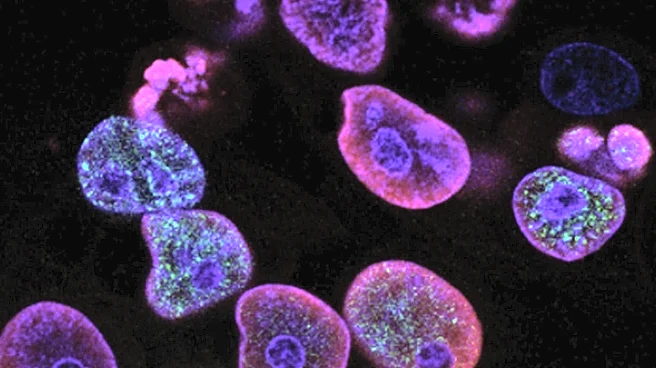What's Happening?
Recent research has highlighted the role of the RNA-binding protein hnRNPM in colorectal cancer (CRC). The study found that hnRNPM is upregulated in CRC tissues compared to normal tissues, suggesting its
potential as a biomarker for the disease. The research involved analyzing CRC samples and found that hnRNPM mRNA expression was significantly higher in cancerous tissues. The study also explored the effects of silencing hnRNPM, which resulted in reduced proliferation of colon cancer cells both in vitro and in vivo. This suggests that hnRNPM could be a target for therapeutic interventions. The research further delved into the alternative splicing events regulated by hnRNPM, which are associated with tumor-related functions such as cell proliferation and migration.
Why It's Important?
The findings are significant as they provide insights into the molecular mechanisms of colorectal cancer, one of the leading causes of cancer-related deaths. By identifying hnRNPM as a potential biomarker, the study opens avenues for early detection and targeted therapies, which could improve patient outcomes. The ability to suppress cancer cell proliferation by targeting hnRNPM could lead to the development of new treatments that are more effective and have fewer side effects compared to conventional therapies. This research also contributes to the broader understanding of RNA-binding proteins in cancer biology, potentially influencing future studies and therapeutic strategies.
What's Next?
Future research could focus on developing drugs that specifically target hnRNPM, potentially leading to new treatment options for colorectal cancer patients. Clinical trials may be necessary to evaluate the safety and efficacy of such treatments. Additionally, further studies could explore the role of hnRNPM in other types of cancer, expanding its potential as a universal cancer biomarker. The study also suggests the need for more research into the alternative splicing events regulated by hnRNPM, which could uncover additional therapeutic targets.
Beyond the Headlines
The study highlights the complex role of RNA-binding proteins in cancer, emphasizing the need for a deeper understanding of their functions and interactions. The ethical implications of using genetic information for cancer treatment also warrant consideration, particularly in terms of patient consent and data privacy. As research progresses, it will be important to balance scientific advancement with ethical responsibility.









